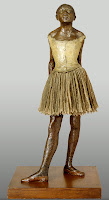Just like the TV reality shows it lampoons, the new musical
Nobody Loves You, now playing at Second Stage Theatre through Aug. 11, is silly and yet
enjoyable at the same time.
The playwright Itamar Moses wrote the book, his pal Gaby
Alter wrote the music and the two collaborated on the lyrics. Romantic comedies set among today’s over-educated,
pop-culturally aware and tech-savvy twentysomethings are Moses’ specialty
(click here to read my thumbs-up review of his previous rom-com Completeness).
The premise this time out is that Jeff, a snooty philosophy
Ph.D. student goes on a TV dating show (think the lovechild of “The Bachelor”
and “Big Brother”) to win back his ex-girlfriend because he thinks she will be
a contestant on what was, to his dismay, her favorite show.
It turns out that she’s already found someone else but Jeff
sticks around, telling himself that the show is a perfect subject for his dissertation
on the elusiveness of reality. In the
process, he finds a new love and a whole new set of problems.
It’s all nonsense but Moses has a great time poking fun at Jeff's fellow contestants who span the gamut of reality types, from the wild-and-crazy gal to the devout Christian who’s trying to resist the temptations being
hurled at him. Providing additional targets are a slick airhead emcee and a
rabid fan who live blogs each episode of the show, which is also called "Nobody Loves You."
The jokes are pretty predictable but that doesn’t stop the show’s
go-for-broke cast from squeezing fresh laughs out of even the lamest groaners. The
veteran scene-stealers Leslie Kritzer and Rory O’Malley get extra points for
each portraying three different characters and making them all distinctively
different and often hilarious.
But everyone, under the sure-handed direction of Michelle Tattenbaum, is terrific (click here to read about the making of the show). However, I do wish that three of the guys hadn't looked so tall-dark-and-handsome alike that they seemed
almost interchangeable. But the whole cast is
so uniformly good looking and so well-toned that I wondered if the job contract
included a clause requiring Pilates workouts.
Of course this is a musical and so it should be telling that I’m just now getting around to talking about the music. The songs—at least the lyrics—aren’t that bad but the orchestrations by Alter and Dan Lipton are so generic that the score ends up sounding just like every other would-be rock musical and I can’t remember one tune.
Still, I left with a smile on my face. As my theatergoing buddy Bill and I strolled over to 9th Avenue for a late dinner at the bistro 44 & X, he summed up Nobody Loves You as an amiable show.
Of course this is a musical and so it should be telling that I’m just now getting around to talking about the music. The songs—at least the lyrics—aren’t that bad but the orchestrations by Alter and Dan Lipton are so generic that the score ends up sounding just like every other would-be rock musical and I can’t remember one tune.
Still, I left with a smile on my face. As my theatergoing buddy Bill and I strolled over to 9th Avenue for a late dinner at the bistro 44 & X, he summed up Nobody Loves You as an amiable show.
That’s an apt description but you could also think of it, as I
often do reality shows (and yes, I do watch some of them) as a sweet guilty
pleasure.







